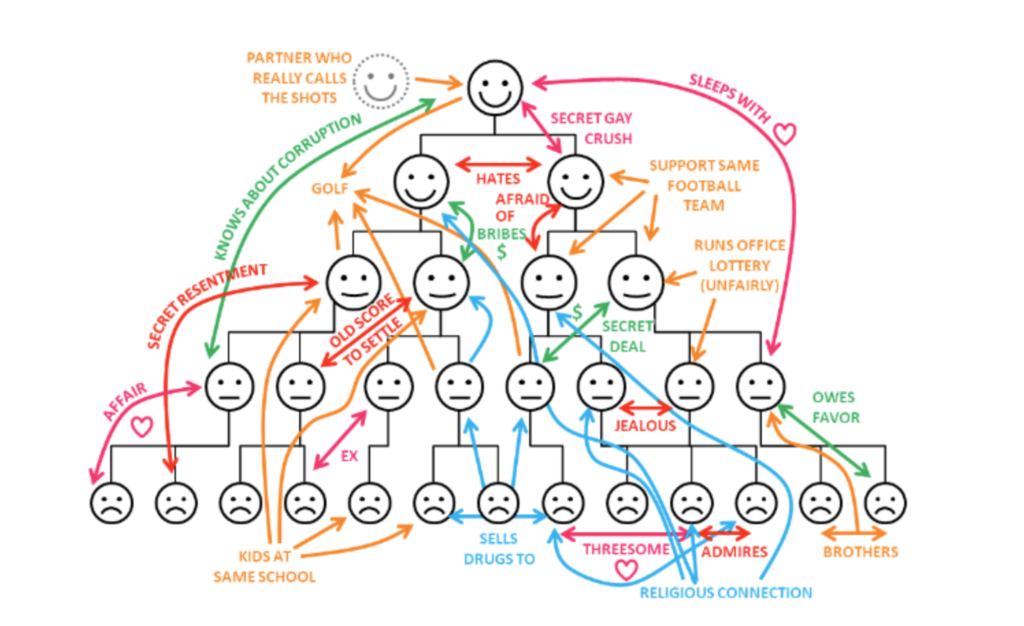Table of contents
Let’s cut to the chase: you should be engaging in office politics. If you want to see a difference in your organization, if you want to create a positive, effective workplace, you have to get involved. Your unwillingness to engage in the political system at work could not only hold back your career, but impact your team’s ability to perform at their best.
Many people feel that playing the political game involves devious plotting or blatant self-promotion. But in reality, “politics” is what naturally happens whenever people with different goals, interests, and personalities try to work together.
Mary G. McIntyre, Secrets to Winning at Office Politics: How to Achieve Your Goals and Increase Your Influence at Work
You may have very good reasons for not playing office politics:
- “Because it’s not what ‘good people’ do.”
- “Because good work should be recognized on its own merits.”
- “Because I’d rather go somewhere else.”
- “Because we don’t have any office politics here.”
- “Because that’s just not who I am.”
Unfortunately, those are myths. Self-limiting myths. So let’s start breaking them down.
First, office politics is the use of relationships as a means to get things done. And yes, it can be manipulative. Inefficient. Self-interested. But it doesn’t have to be. You can balance individual needs with what’s best for the organization and customers. And it’s important to remember that, because there is no such thing as an organization without office politics. You can’t find a politics-free workplace, or assume it doesn’t exist in yours. In every human organization, relationships play a part in how the work gets done.
Now, let’s pop the bubble of meritocracy. Yes, it would be great if only the best ideas rose to the top, only “good” people got promotions, and only good arguments won debates. But the world is messier than that, and busier—people are working too hard to actively seek out good ideas. So ideas need advocates. People need champions.
Look, we get it. A lot of us wish we wouldn’t be roped into participating in power games at work. When we stand outside the system, we think we’re setting an example or upholding the moral high ground. And we keep thinking those thoughts riiiiiiiight up to the point we’re laid off, or our ideas dismissed. Standing outside the system doesn’t mean you won’t be affected by it—just that you won’t influence it.
You must join the fray of office politics because it desperately needs healthy competition. We need leaders who are willing to balance their own self-interest along with collective needs and organizational goals. If you’re reading this and squirming, then you’re the person that your organization needs to step up.
Preparing for Office Politics
If you’re going to enter the ring, you may first have to reconcile with the fact that you’re going to engage in behavior that feels duplicitous or “not like you.” We would encourage you to first, reframe some of these beliefs, and second, establish some personal boundaries:
- Know why you’re doing it. Office politics don’t have to (and shouldn’t) be entirely self-serving. Find a cause worth fighting for. Maybe it’s a new idea, the organization’s mission, the benefit to your customers, or the welfare of your teams.
- Know your values and non-negotiables. Office politics require relationship building and compromise—but some values shouldn’t be compromised. Determine in advance what lines you’re not willing to cross, what your ethical boundaries are, and what you’ll do if you see warning signs that those boundaries are in jeopardy.
- Determine what you want to get, and the timeline. Similarly, evaluate what you’re trying to achieve. Are you looking for a quick win to accelerate your career? Are you trying to build relationships for the long term? Or somewhere in between?
- Have outlets outside of work. The workplace is just one place to invest your energy. Maintain your identity outside of it—otherwise, you may feel like you’re losing touch with yourself or compromising your integrity.
Seeing the Water
Observe the behavior of your environment carefully for clues as to what is acceptable and rewarded.
Bonnie Marcus
Before attempting to influence anything, you must understand how influence works within your organization. What are the rules of your culture? What does it celebrate? Who is lauded? Who and what are punished? What established relationships (and amenities) exist?
This information is rarely officially established. Org charts don’t capture whose opinion really matters on crucial decisions or how things actually get done. Informal relationships aren’t documented; preferred communication styles typically have to be learned one-on-one. Nor are incentives fully documented: what do individuals want beyond their KPI’s? Is it a promotion? Less headaches? A future favor?

Some of this information can be gained through observation, but some can only be exposed through experimentation. Only by trying to get things done, and seeing how the organization reacts, can tell you the real sources of power.
However you come to understand influence in your organization, be a good anthropologist and document your findings for yourself. Construct a “map” of the political territory that you can use to navigate relationships and get things done, and then revise that map as your understanding sharpens.
Gaining Influence
Typically, we use the term “playing politics” only to describe our colleagues’ behavior—never our own. They are sucking up, scheming, and manipulating, but we are building relationships, developing strategies, and opening communication channels.
Marie G. McIntyre
Now it’s time to take stock of your existing relationships. Consider the networks you’ve already developed within the organization:
- Your operational network: these are the folks who help you get work done
- Your strategic network: these folks help you gather information and make sense of what’s happening around you
- And your developmental network: the folks who can help you grow, develop, and gain influence (who you know determines what opportunities you get)
In thinking through your networks, you may have already identified people you’d like to develop a stronger relationship with, or noted that you’re missing some key individuals within a network (or, you’re missing a network entirely). Once you’ve figured out what relationships need tending, accrue social capital by bonding beyond the office. Invite them for coffee or drinks to start learning about their personal interests and activities. Mirror their affect and style (e.g. if they’re excited, try being excited too). Try not to bond exclusively over negativity—it might be an easy way to start a conversation (who doesn’t have gripes about the office?) but exclusively venting about work positions you as a negative influence.
Meanwhile, in the workplace, you should be building a team that values increasing their own influence. Look for individuals who can both get the work done AND build demand for their services through relationship building and affinity. The unfortunate reality is that if you only have a team of fantastic doers—without relationships and a knowledge of how to get things done—their work will be ignored and undermined, and they become depleted and dismayed.
Personally, you should also be developing subject matter expertise in your particular role as well as expertise in how things get done in your organization. You want to become an indispensable resource for others, the “go to” person for both making key decisions, and knowing how decisions at your organization are shaped. What are the rules, and which can be broken? Who controls budgets? What’s required to actually get approval?
In addition, consider building influence outside of the organization and become known as “someone to watch.” That might mean having an active social media presence, connecting with journalists, getting on lists, or joining boards.
Wielding Influence
Finally, it’s time to start putting those relationships to work. Always consider that these tactics can be used to help or harm—in deciding what tactics to pursue, return to your desired goals, values, and what compromises you will or won’t make toward your goals.
- Ideally, you’ll start by not asking for anything at all, but by giving. By helping and connecting others, and building up a reputation as an effective, connected individual within the organization. People will be more likely to build a relationship with you if they see that you leverage relationships to help others.
- Flex your expertise. In toxic workplaces, expertise is often used to obfuscate responsibility, cloud decision-making, or block others from participating. However, you can also use expertise to educate others, to make the complicated more approachable, to offer alternative solutions, and to help others navigate the political environment for themselves.
- Consolidate power. One obvious way to wield influence is to simply control more of the organization’s decision-making: budgeting, hiring, staffing, governance, leadership of key initiatives, and so on. You can do so either by maneuvering yourself into key roles or by drafting the very policies and processes the organization follows.
- Seek win-wins. When you do need help from others, pursue win-win situations whenever possible: how can others benefit from the situation as well? This might involve shrewd bargaining, reciprocal concessions, and favors (and don’t forget, incentives look different for every individual). Ironically, asking for favors can work in your favor: people having a “call” on you in the future is a way to build relationships.
- Move quickly. Power takes a long time to accrue, but can be lost in an instant. When you do gain the power to lead a long-needed project, for example, put early stakes in the ground and make sure to own the story of the effort. This creates organizational sunk costs and helps you avoid dissenters picking apart your program and finding one failure to hang everything else on.
Remember Your Original Motivation
As you’re building relationships, concentrating your influence, and weaving narratives, it’s easy to forget why you started doing this, and focus on simply accruing more power. Power is heady stuff, after all, and the stakes can feel high. That’s why it’s so essential to regularly check in (potentially with a coach or trusted advisor) on your values and objectives. Is your team able to accomplish more? Is the organization making more progress on its mission? Are you becoming the type of leader you want to be?














